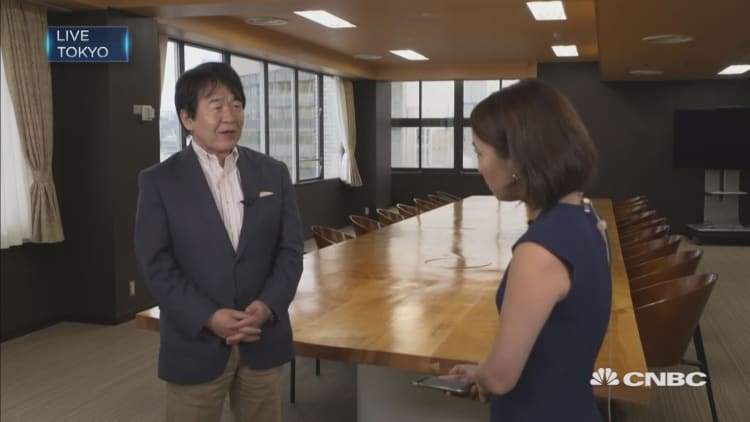British Prime Minister Theresa May is in Tokyo this week, actively attempting to assuage fears that Japanese business leaders have on the possible impact of Brexit on their U.K. businesses.
But corporate owners don't necessarily care about the bilateral terms between Japan and Great Britain. Instead, they really want a liberal global trading environment. And that's well beyond May's control.
Business leaders from Japan, the world's third-largest economy, are carefully tracking global trade trends to decide if they want to remain invested in the U.K., said Heizo Takenaka, a former Japanese minister of state for economic and fiscal policy. A trend toward liberalism could boost Japanese companies' confidence in overseas projects in the long term, he added.
Japan's preference for free trade may work in May's favor as the prime minister seeks to strike a U.K.-Japan trade deal some time in the future, after Britain officially leaves the European Union in 2019.
"A Japan-England free trade agreement is very important to stop the movement of populism. To stop the movement of anti-free trade," Takenaka said.
However, the United Kingdom has also been perceived by some to reject the free trade model, following its vote to leave the EU last year. May, for her part, has reiterated her support for economic liberalism.
"If we look at free trade and globalization, I'm a promoter of free trade, I believe in free trade. I believe that it brings economic growth and prosperity. And globalization does," May told CNBC at the World Economic Forum in Davos earlier this year.

In view of Brexit, Japanese corporate leaders have expressed fears that trade restrictions and tariffs could hurt their U.K.-based businesses.
"In the case of manufacturers, they already have invested a lot of money in fixed assets. So it's very difficult to withdraw that," Takenaka said. "So, it's very important for them to keep a very favorable tariff situation and institutional arrangement even after Brexit."
May is on a three-day diplomatic visit to Tokyo, accompanied by a delegation of 15 U.K. business leaders. She is expected to engage in unofficial free-trade discussions with her Japanese counterpart, Shinzo Abe. Part of May's mission for her Tokyo visit is to calm some of the trade concerns.
The U.K. delegation is hoping to "maintain good relations, give confidence to the Japanese side, and indicate the hopes of the U.K. to develop a strong bilateral relationship going forward," said David Bickle, president of the British Chamber of Commerce in Japan.
May cannot enter into any official trade talks with Japan until Brexit negotiations are completed, which is expect to take place March 2019. She has said that the U.K. would be interested in replicating some of the benefits of the bilateral EU-Japan deal, which was passed last month.
Japan has emerged as a perhaps-unexpected defender of free trade in recent months. Following President Donald Trump's withdrawal from the Trans-Pacific Partnership, a formerly 12-country agreement between the U.S. and nations from around the Pacific Ocean, Japan has proven to be willing to lead the pact, analysts said.

